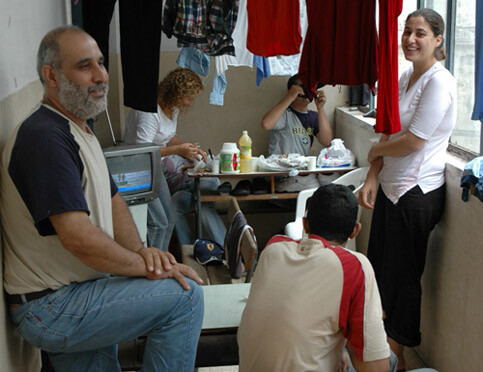IRIN 17 July 2006

People displaced by ongoing Israeli attacks take refuge in the Karm al-Zeytun primary school in Beirut. (Peter Speetjens/IRIN)
BEIRUT - Apart from a few mattresses, some clothes and a water pipe, the classroom on the third floor of the Karm al-Zeytun primary school is empty. Chairs and tables stand piled up outside, forming a makeshift home for Hussein Nuridin and his family.
Nuridin fled south Beirut on Sunday, his family having left before him. He initially wanted to keep an eye on his house, he explained, but the Israeli bombardment of the area became so intense that he says he had no choice but to leave. “They bombed a Hizbullah agricultural cooperative and some 40 other buildings on my street alone,” he said. “They’re using vacuum bombs, one of which is enough to destroy an entire building. Part of my area – Bir al Abed – has been completely flattened.”
The school in Karm al-Zeytun, a poor Christian area at the heart of east Beirut, currently hosts 282 displaced people from the southern outskirts of the capital and from southern Lebanon, according to Mark Daou, member of the Samir Qassir Foundation, one of the many Lebanese NGOs offering help to the displaced. “In the first two days, people in the neighbourhood weren’t very helpful,” he said. “But when they saw the destruction caused by Israeli bombing, they started really taking care of the injured. We just received 250 portions of food, and many people let the children play in their homes.”
Karm al-Zeytun is a well-known stronghold of the Lebanese Forces, a rightwing Christian party that strongly favours the disarmament of Hizbullah. “We don’t like Hizbullah and we blame them for the escalation,” said George, a local resident, preferring not to give his last name. “But what Israel is doing is completely out of order. These are poor people who have nothing to do with the conflict.”
Khoulaid Abbas and her family fled here from the southern village of Rowaize, where their home is located only 250 meters away from a bridge that was heavily bombed on Friday. “It’s our first time in Karm al-Zeytun,” she said. “Most people are very good to us, but some refuse to talk to us because we’re Muslims.”
According to Daou, displaced peoples are not yet facing any major shortages. “We provide basic food and water. We only have 50 mattresses so far, which we’ve given to the elderly and to small children,” he said. “While we only have aspirin, we should receive more medication today.”
Hihsan Freysh and his family fled here from the southern village of Maroub, near Tyre, on 13 July after the first bombardments. They drove through the mountains for hours with four other families to get to Beirut, explained Freysh, half of whose family remains in Maroub. “People thought they could leave later, but everything got worse,” he said. “Most bridges and roads have been destroyed and people can’t leave. My cousin tried on Friday, but her car was hit and she died of injuries yesterday.”
It is the third time Freysh and his family have had to flee violence in the south. “First in 1993, then in 1996, and now again,” he said. “Let’s hope this is the last time.”
So far, it has proven extremely difficult to estimate exactly how many Lebanese have fled due to the ongoing violence. “There are many conflicting reports,” said Hisham Hassan, spokesman for the International Committee of the Red Cross (ICRC) in Beirut. “But we know there are thousands of people from the south in the Chouf Mountains. In Beirut, there are lots of schools that have been transformed into shelters, and we’ve been told that some 10,000 families fled further north.”
Despite the bombing today of the Sunni-dominated port city of Tripoli by Israel, there have been no reports of a mass exodus. “The main problem now is in the south, where thousands of people are stuck,” said Hassan. “They can’t leave because all the infrastructure was destroyed, while aid workers have great difficulties getting in.”
Related Links
This item comes to you via IRIN, a UN humanitarian news and information service, but may not necessarily reflect the views of the United Nations or its agencies. All IRIN material may be reposted or reprinted free-of-charge; refer to the copyright page for conditions of use. IRIN is a project of the UN Office for the Coordination of Humanitarian Affairs.